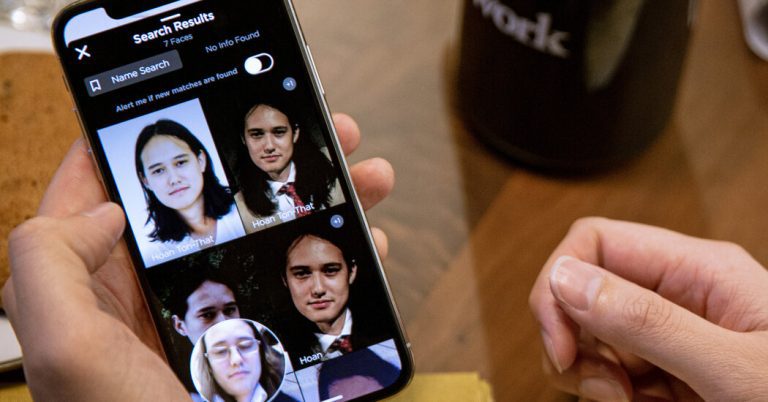A facial recognition startup accused of violating privacy in a class-action lawsuit has agreed to a settlement, with a twist: Instead of cash payments, it would give a 23 percent stake in the company to Americans whose faces are the basis his data.
New York-based Clearview AI crunched billions of photos from the web and social networking sites like Facebook, LinkedIn and Instagram to create a facial recognition app used by thousands of police departments, the Department of Homeland Security and The FBI After The New York Times revealed the company’s existence in 2020, lawsuits were filed across the country. They were brought together in federal court in Chicago as a class action.
The litigation proved costly for Clearview AI, which likely would have filed for bankruptcy before the case reached trial, according to court documents. The company and those suing it were “caught together in a sinking ship,” lawyers for the plaintiffs wrote in a court filing proposing the settlement.
“These realities led the parties to seek a creative solution by getting the class a percentage of the value that Clearview could achieve in the future,” added the lawyers, from Loevy + Loevy in Chicago.
Anyone in the United States who has a photo of themselves publicly posted on the Internet — so almost everyone — could be considered a member of the class. The settlement would collectively give the members a 23 percent stake in Clearview AI, which is valued at $225 million, according to court filings. (Twenty-three percent of the company’s current value would be about $52 million.)
If the company went public or was acquired, those who had filed a claim form would get a cut of the proceeds. Alternatively, the class could sell its stake. Or the class could choose, after two years, to collect 17 percent of Clearview’s revenue, which it would have to set aside.
The plaintiffs’ attorneys will also be paid from the eventual sale or redemption. they said they would not ask for more than 39 percent of the amount the class received. (Thirty-nine percent of $52 million would be about $20 million.)
“Clearview AI is pleased to reach an agreement in this class action settlement,” said the company’s attorney, Jim Thompson, a partner at Lynch Thompson in Chicago.
The settlement must still be approved by Judge Sharon Johnson Coleman of the US District Court for the Northern District of Illinois. Notice of the settlement would be published in online ads and on Facebook, Instagram, X, Tumblr, Flickr and other sites from which Clearview obtained photos.
Although it seems like an unusual legal instrument, there have been comparable situations, said Samuel Issacharoff, a law professor at New York University. The 1998 settlement between tobacco companies and attorneys general required the companies to pay billions of dollars over decades into a fund for health care costs.
“This was being paid for out of their future revenue streams,” Mr. Isakharov said. “The states have become the real owners of the companies that are moving forward.”
Jay Edelson, a class action attorney, is an advocate of “future settlement bets” in cases involving cash-strapped startups. Mr. Edelson has also sued Clearview AI, along with the American Civil Liberties Union, in an Illinois state lawsuit settled in 2022, with Clearview agreeing not to sell its database of 40 billion photos to businesses or individuals .
Mr. Edelson, however, said there was an “indolence factor” in this proposed arrangement.
“Now you have people who are injured by Clearview’s violation of their privacy rights and have a financial interest in Clearview finding new ways to violate them,” he said.
Evan Greer, director of Fight for the Future, a privacy advocacy organization, was also critical.
“If mass surveillance is harmful, the solution should be to prevent them from doing it, not to pay pennies to the people who are harmed,” Ms Greer said.




